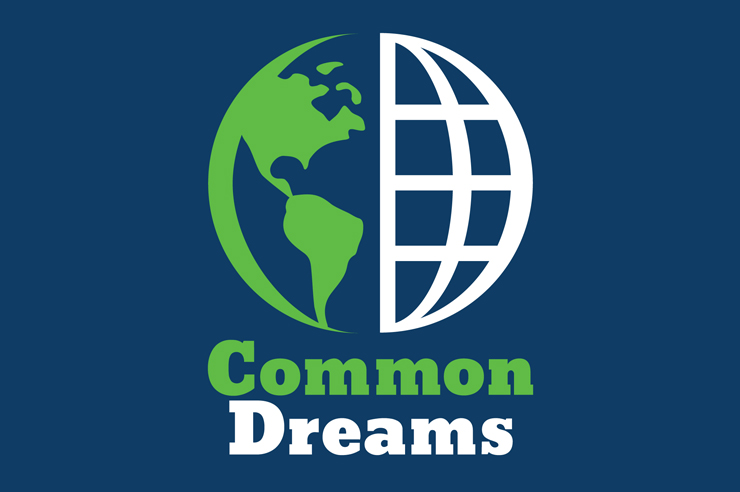The scandal-ridden corporation received billions in public funds—and it still wants more.
Published on Common Dreams.
We know the damage Enron has done to the American economy. So why is it still eligible to receive U.S. taxpayer money? Instead of wallowing in bankruptcy, Enron continues to do business internationally. And believe it or not, the scandal-ridden and discredited corporation continues to pursue public funding for its global operations.
The ongoing reports about Enron’s collapse have led many people to believe that the corporation is for all practical purposes defunct. Not so. Enron’s decision to file for Chapter 11 bankruptcy protection caused it to forfeit its energy-trading operations in America and forced the corporation to sell some of its assets. But a large number of its overseas ventures remain intact. Even as it faces shareholder lawsuits and Congressional inquiries in the United States, Enron plans to emerge from bankruptcy carrying forth its global energy services.
Enron, through numerous consortia and subsidiaries, continues to manipulate energy markets in countries throughout the world. Its present assets in Latin America alone include stakes in gas and electricity companies in Brazil and Venezuela, pipelines in Colombia and Bolivia, and power plants in Panama, Guatemala, and Puerto Rico. In many of these countries, officials have been assuring that the problems that the Enron Corporation has in the United States will not affect their local operations.
Generous American taxpayer money has helped build the corporation’s global empire. A new report by the Institute for Policy Studies in Washington, D.C., shows that since 1992, Enron-related projects have received more than $4 billion in U.S. government financing. Other public sources—like the World Bank and the European Investment Bank—contributed an additional $3 billion.
By any standard, $7 billion is a lot of money. But now Enron wants more. The Inter-American Development Bank (IDB), an agency operating with government money, is considering a $125 million loan for a Bolivian gas pipeline expansion that Enron is pursing through a group called Transredes. Along with Shell Bolivia, the other key stakeholder in this consortium, Enron stands to profit in Bolivia by using public funds to further its objectionable practices.
Like at home, Enron abroad has a long history of pushing industry deregulation and avoiding oversight. The Bolivian government has recently begun investigating irregularities in the process by which Enron initially gained entry into the country’s energy markets. Environmental and human rights organizations such as the Organization of Ethnic Communities of Santa Cruz (Bolivia) decry the fact that the proposed enlargement of the Transredes pipeline would cut through ever larger sections of ecologically sensitive areas, as well as the protected lands of Bolivia’s indigenous peoples. They point to a previous disaster in which the company’s Sica Sica-Arica oil pipeline ruptured in January 2000, spewing thousands of barrels of refined crude into the Desaguadero River before officials got around to making repairs.
Why would the U.S. continue to help bankroll such sordid deals? In the name of “free trade,” government-funded organizations like the IDB and the World Bank have spent over two decades promoting privatization of energy and power sectors. Since the Reagan Administration, they have forced countries that want development assistance to implement harsh “structural adjustment” measures and deregulate industries. At the same time, multinational corporations play poor governments against one other for much-needed foreign investment.
As a result, public utilities have increasingly fallen into private hands and corporations like Enron conduct their business with little or no public accountability. Ordinary people suffer as companies limit supplies and raise prices, spreading misery among those who can’t afford to pay more for once-public services like electricity, water, and health care. This also produces social unrest. Enron’s imposition of price hikes has resulted in blackouts that eventually led to riots in Guatemala and the Dominican Republic, among other countries.
Members of Congress will have an opportunity to stop the flow of government funds to Enron, when the IDB and other public financiers come up for reauthorization. Before approving any more money for the banks, legislators can insist on prohibiting future loans for Enron-related projects. This would put a stop to destructive and irresponsible deals like the Bolivian pipeline expansion.
Such a ban against more taxpayer money for Enron’s international exploits would serve as a good first step, but more is needed to stop similar abuses. The rules governing global trade and investment need to be altered to protect the public interest. We need to reject the drive by international financial institutions like the IDB and the World Bank to privatize utilities and to promote deregulation—policies that invite Enron-style corruption and fuel injustice. And we need to express the same outrage at corporate misdeeds abroad that we show when the scandal hits home.
